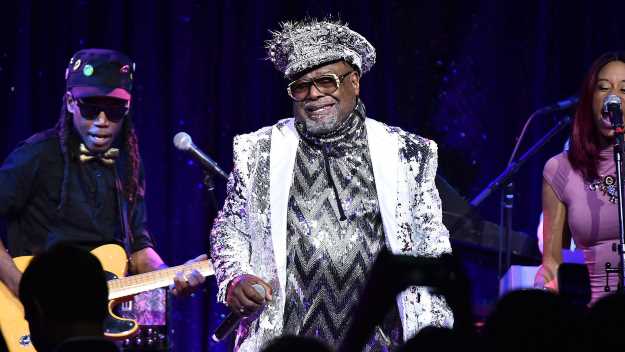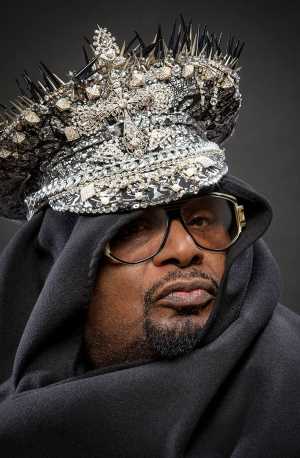|
Taken from KQED (Aug 30, 2018)
'It's That Naughty Feeling': George Clinton on Funk's Enduring Appeal
by Nastia Voynovskaya

Clinton performs at the 2017 SESAC Pop Awards on April 13, 2017 in New York City. (Theo Wargo/Getty Images for SESAC) |
Ask George Clinton about the first time he came to the Bay Area, and the 77-year-old funk legend remembers it vividly.
Well, almost vividly.
The year was 1971, just before the release of Funkadelic's America Eats Its Young, a rock-influenced project drenched in far-out jam sessions and Summer of Love psychedelia. In a phone interview from his home in Tallahassee, Florida, he admits his memories of that time are hazy, but he definitely went to Haight-Ashbury and dropped acid.
"We was overgrown hippies," he laughs in his low, raspy tone. "It's one carnival of a good time when you play over there."
Clinton, who returns to the Bay Area to play the Sausalito Art Festival on Sept. 1, knows a thing or two about a good time. If one were to diagram the family tree of present-day American popular music, a good number of its branches would trace back to Clinton, the eccentric funk pioneer whose bands Parliament and Funkadelic were responsible for genre-defining hits like "Flashlight," "Give Up the Funk (Tear the Roof off the Sucker)" and "One Nation Under a Groove."
Clinton's deep grooves, larger-than-life performances (his spaceship stage prop is in the Smithsonian) and otherworldly fashions were a major source of inspiration for Prince, who inducted Parliament-Funkadelic into the Rock'n'roll Hall of Fame in 1997. In turn, Prince passed those funky, Afrofuturist sensibilities onto Janelle Monae, with whom he had a close working relationship. Meanwhile, Childish Gambino won a 2018 Grammy for cloning Clinton's sound on "Redbone," a reinterpretation of "I'd Rather Be With You," which Clinton produced for Bootsy Collins.

As the father of funk and one of the most sampled artists in hip-hop, George Clinton has made a lasting mark on American popular music. (Jenny Risher) |
Not to mention, Clinton is one of the most-sampled artists in hip-hop history. Dr. Dre's Death Row Records, Tupac's Digital Underground and Too $hort drew the blueprint for West Coast rap from Parliament and Funkadelic's infectious grooves. New iterations of the style live on today through artists like Kendrick Lamar, YG and Kamaiyah.
In short, the offshoots of Clinton's influence are infinite.
"Funk is the DNA in all of that hip-hop, electronic music-whatcha call it-house music, rave," says Clinton. Over 60 years into his music career, he's still going full force, with a new Parliament album out called Medicaid Fraud Dogg and a hectic tour schedule. (For the past two years, he's been touring extensively with psychedelic producer Flying Lotus and experimental bassist Thundercat, both of whom he's greatly influenced.)
Life on the road can take a toll on one's health, and Clinton is preparing to retire from performing live in 2019. He told HipHopDX that he was "funkin' too hard" for his pacemaker when he made the announcement earlier this year.
However, Clinton's impending retirement from touring doesn't mean he's ready to slow down creatively. He plans to record new material with Parliament-Funkadelic, and he's training his next generation of heirs. Several of his grandchildren and kids he "found in Tallahassee" lent modern rap and R&B stylings to the '70s slap of Medicaid Fraud Dogg.
When I ask Clinton about the scores of Californian artists he's influenced, he says with a chuckle, "I guess the West Coast got the funk," before schooling me on which Parliament and Funkadelic tracks took off in which region. (Funkadelic's "Knee Deep" and "One Nation Under a Groove" and Parliament's "Flashlight" resonated on the West Coast, he says, while Funkadelic's trippier Maggot Brain and Free Your Mind... solidified his fan base in the East. The South was into all of it.)
As Gen X, millennial and Gen Z fans continue to debate what constitutes "real" hip-hop, Clinton takes a much longer view of music.
"The way I look at it is, the music that gets on your nerves is usually the new music," he says. "The music you least wanna like is always the music that's actually putting you out of business. So just let yourself go and enjoy."
Rather than shake his fist at the kids who've cobbled their own styles out of Parliament-Funkadelic's perpetually pulsing grooves, Clinton challenges himself to keep an open mind. He's even into current chart-topper Cardi B. "I love Cardi B! You can't help but-the groove is so for real, but your first instinct is, 'What the hell is this?!'" he exclaims, then pauses. "When I first heard her, just the tone of her voice sounded like a good time."
As for the reason for his music's longevity? Clinton attributes the enduring appeal of funk-and the ways its spirit lives on through so many disparate newer genres-to a visceral feeling. "It makes you frown up, makes you squint your nose up-almost like something stinks but it still feels good anyway," he says. "It's that naughty feeling. That's the funk breaking out, that's when your body's betraying you."
Parliament's 2018 album is their first release since 1980's Trombipulation, though Clinton has put out plenty of music-solo and with Funkadelic-in the intervening years. The distinction between Parliament, Funkadelic and Parliament-Funkadelic is often blurry; when we talk, Clinton calls the loose musical collective a "thang" rather than a band. The latest incarnation features original members and their children.
In the tradition of previous Parliament-Funkadelic releases, Medicaid Fraud Dogg is a concept album that uses sci-fi imagination and raunchy bodily-function humor to underscore real-world issues-in this case, Big Pharma and the opioid epidemic.
"It's really one nation under sedation. They've got people hooked on things that sound like Tylenol or Aspirin, but really they're hardcore drugs," says Clinton, who himself struggled with drug addiction for years and now abstains from everything except medical marijuana. "The Food and Drug Administration have a nice game goin' with people's lives and bodies."
Few musicians can say they've remained relevant since the '60s, when Clinton first became a staff songwriter at Motown. He attributes his longevity in the digital age to his quickness to adapt to the internet, which he likens to FM radio taking off 60 years ago.
"I've always dealt with it from the underground point of view," he says. "With YouTube, you just put your records on the air. Once we realized we could do that, we started focusing on social media just like the kids do."
Parliament-Funkadelic were undoubtedly ahead of their time. With their conceptual albums, alien- and space-themed album art and outlandish performances, their work-like that of jazz pioneer Sun Ra-predated the term "Afrofuturism," which scholar Mark Dery coined in the early '90s. Now, with the popularity of Erykah Badu, Janelle Monae, Outkast and Missy Elliott, science fiction is part of popular music's vocabulary for imagining more liberated futures where people, and black people in particular, are free to express themselves.
"Now it should be common, because we're getting ready to visit other planets, it's a reality to this generation," says Clinton, for whom funk is clearly a universal life force, an energy.
And when that next generation gets to other planets?
"They're gonna find out," Clinton chuckles, "the funk was out there already."
|